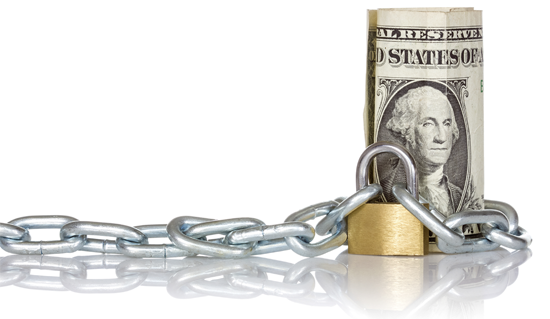
August-
September 2013
Do You Have
Sticky Faith?
------------------
|

brown on green, A Regular column about finances
Looking for Yield in All the Wrong Places
Be careful when “locking-in” low interest rates
We live during a time when it is difficult to find a good return on your investment. This is especially challenging for those who live off the interest. The best yield on five-year certificates of deposit (CDs) is a measly 1.6%. The ten-year U. S. Treasury bond returns 2.02%, and 30-year Treasury bonds only 3.2% as this article is being written. These rates do not generate much income, yet many investors have locked-in investments at these low rates.
Most economists believe interest rates have reached their low point, but it may be many months before they rise. Still, they believe the next move will be up rather than down. This causes problems for those who lock in low rates on long-term CDs or even longer-term Treasury bonds.
When interest rates begin to go up, they will face a difficult choice. A CD holder may decide to pay the early withdrawal fees to switch to a higher yield. The cost of these fees will discount their new higher rate of return. Those who own 30-year bonds have an even worse situation. They will lose 20% of the value of their bond for every 1% rise in interest rates.
A $1,000 investment purchased when rates were 3.2% will lose $200 of value when interest rates reach 4.2%. They will be able to sell their $1,000 investment for only $800. This will make it difficult to take advantage of rising interest rates.
Many choose to invest in dividend stock for a higher yield in this extremely low interest rate environment. It is likely that when interest rates rise it will be possible to sell out of the dividend stock with no loss and reinvest in bonds at a later date. Although stocks are subject to market volatility, many traditional dividend stocks are less risky. It is also possible to time the sale of your stock in a way that will mitigate against loss and possibly even generate capital gains.
The Money Management Trust (MMT) program managed by Free Will Baptist Foundation is another way to receive the best possible yield. Historically, we have been able to keep pace with interest rates and keep our rate competitive even when yields begin to rise. Currently, our Money Management Trusts offer 2.75%, and your money is always accessible.
Anyone considering an investment right now should stop looking for yield in all the wrong places and consider a dividend stock portfolio or the Foundation MMT program until interest rates return to a more reasonable level.
David Brown, CPA, became director of the Free Will Baptist Foundation in 2007. Send your questions to David at david@nafwb.org. To learn how the Foundation can help you become a more effective giver, call 877-336-7575.
|
|

